
Royal Botanic Gardens, Kew is a non-departmental public body in the United Kingdom sponsored by the Department for Environment, Food and Rural Affairs. An internationally important botanical research and education institution, it employs 1,100 staff. Its board of trustees is chaired by Dame Amelia Fawcett.
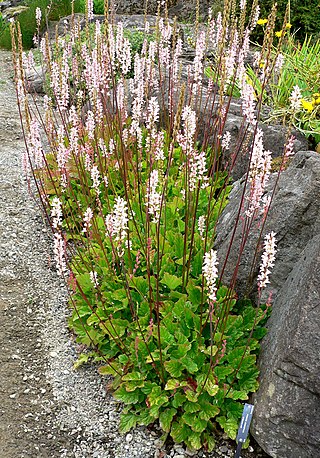
The Francoaceae are a small family of flowering plants in the order Geraniales, including the genera Francoa, commonly known as bridal wreaths. The Francoaceae are recognized as a family under various classification schemes. Under the 2009 APG III system the Francoaceae were included within the Melianthaceae. In the 2016 APG IV system the Francoaceae are again recognized as a family, with Melianthaceae included in the circumscription of Francoaceae.
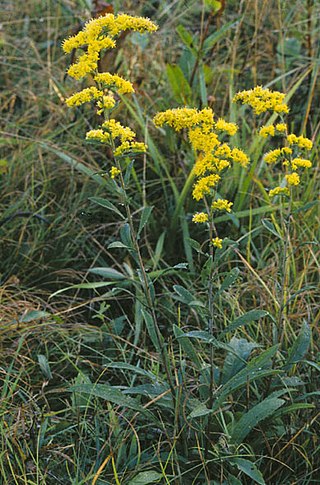
Goldenrod is a common name for many species of flowering plants in the sunflower family, Asteraceae, commonly in reference to the genus Solidago.

Lamium (dead-nettles) is a genus of about 30 species of flowering plants in the family Lamiaceae, of which it is the type genus. They are all herbaceous plants native to Europe, Asia, and northern Africa, but several have become very successful weeds of crop fields and are now widely naturalised across much of the temperate world.
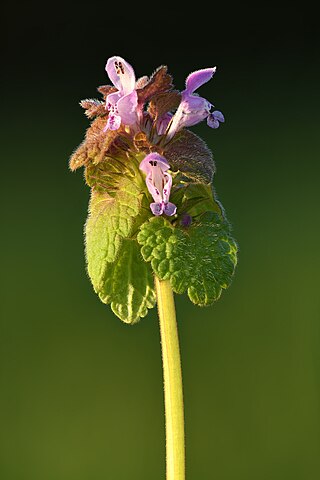
Lamium purpureum, known as red dead-nettle, purple dead-nettle, or purple archangel, is an annual herbaceous flowering plant native to Europe and Asia but it can also be found in North America.

Lamium galeobdolon, the yellow archangel, is a species of flowering plant in the mint family Lamiaceae. It is native to Europe and western Asia but it is widely introduced in North America and elsewhere. It is the only species in the genus Lamium with yellow flowers. Another common name for this species is golden dead-nettle. In New Zealand, it is called the aluminium plant or artillery plant. The common names archangel and dead-nettle have been in use for hundreds of years, dating back to at least the 16th century.

Eriophorum is a genus of flowering plants in the family Cyperaceae, the sedge family. They are found in the cool temperate, alpine, and Arctic regions of the Northern Hemisphere, primarily in the middle latitudes of North America, Europe, and Asia.

Lamium amplexicaule, commonly known as henbit dead-nettle, is a species of Lamium native to most of Europe, Asia and northern Africa. Its status in Great Britain and Ireland is disputed; some sources give it as native, while others cite it as an archaeophyte. The specific name refers to the amplexicaul leaves.
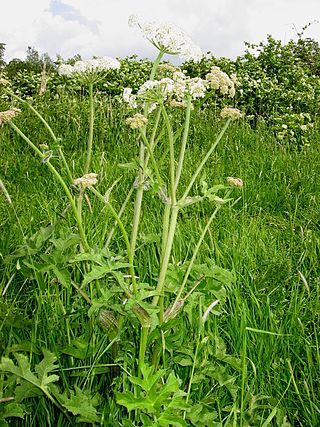
Heracleum sphondylium, commonly known as hogweed or common hogweed, is a herbaceous perennial plant in the carrot family Apiaceae, which includes fennel, cow parsley, ground elder and giant hogweed. It is native to most of Europe, western Asia and northern Africa, but is introduced in North America and elsewhere. Other common names include cow parsnip. The flowers provide a great deal of nectar for pollinators.

Lamium album, commonly called white dead-nettle, is a flowering plant in the family Lamiaceae. It is native throughout Europe and Asia, growing in a variety of habitats from open grassland to woodland, generally on moist, fertile soils.

Lamium maculatum is a species of flowering plant in the family Lamiaceae, native throughout Europe and temperate Asia.

Kew Gardens is a botanic garden in southwest London that houses the "largest and most diverse botanical and mycological collections in the world". Founded in 1840, from the exotic garden at Kew Park, its living collections include some of the 27,000 taxa curated by Royal Botanic Gardens, Kew, while the herbarium, one of the largest in the world, has over 8.5 million preserved plant and fungal specimens. The library contains more than 750,000 volumes, and the illustrations collection contains more than 175,000 prints and drawings of plants. It is one of London's top tourist attractions and is a World Heritage Site.
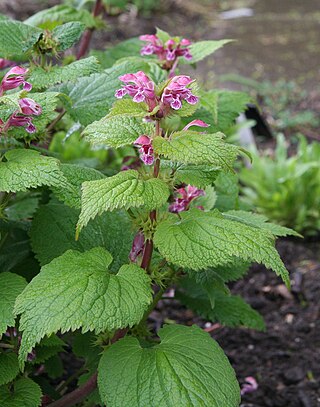
Lamium orvala, known as balm-leaved archangel, is a species of flowering plant in the family Lamiaceae. It is native to Europe.

Lumnitzera is an Indo-West Pacific mangrove genus in the family Combretaceae. An English common name is black mangrove. Lumnitzera, named after the German botanist, Stephan Lumnitzer (1750-1806), occurs in mangroves from East Africa to the Western Pacific, and northern Australia.

Drosera trinervia is a species in the carnivorous plant genus Drosera that is endemic to the Cape Provinces of South Africa. It was first described by Kurt Polycarp Joachim Sprengel in his 1820 work Neue Entdeckungen im ganzen Umfang der Pflanzenkunde.
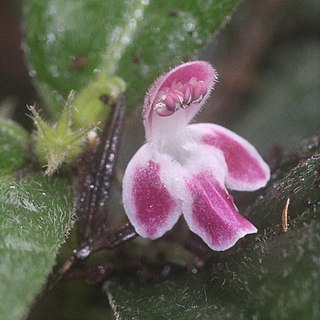
Ajugoides is a genus of plants in the family Lamiaceae, first described in 1915. It has only one known species, Ajugoides humilis, endemic to Japan. It has been reported from the islands of Honshu, Shikoku, and Kyushu.

Callitriche palustris, the vernal water-starwort, narrow-fruited water-starwort, or spiny water starwort, is a species of aquatic plants. It is the type species of its genus.
Plants of the World Online (POWO) is an online database published by the Royal Botanic Gardens, Kew. It was launched in March 2017 with the ultimate aim being "to enable users to access information on all the world's known seed-bearing plants by 2020". This was Kew's answer to the "2020 target 1" of the Convention on Biological Diversity (CBD): "an online flora for all known plants."

Lamium hybridum, the cut-leaved dead-nettle, is a species of Lamium native to western and northern Europe and northwestern Africa. The specific name means 'hybrid'; however, Dominique Villars, in describing the species, did not give his reasons for selecting this name. The English name refers to the deeply cut leaves, unlike the shallower lobes of other related species of Lamium.
Lamium garganicum is a species of flowering plant in the family Lamiaceae.

















